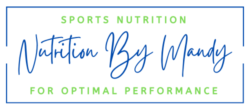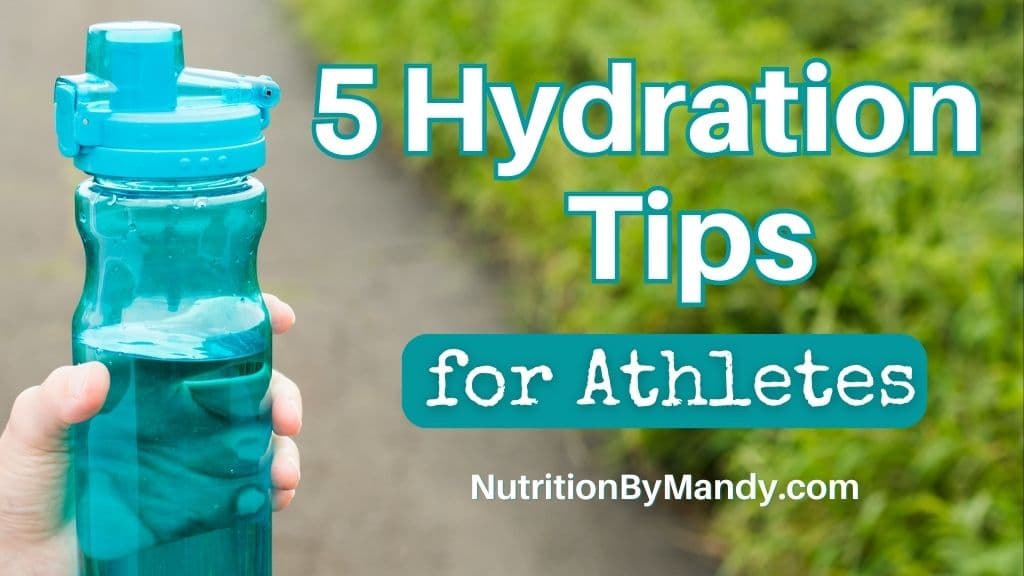5 Hydration Tips for Athletes
Hydration is an essential aspect of an athlete’s sports nutrition plan. It is important for athletes to know how much to drink during activity to prevent both under and overhydration.
Let’s take a look at the importance of hydration for athletes. Then we will explore 5 hydration tips for athletes to support training and competition.
Importance of Hydration for Athletes
Dehydration can negatively impact both health and sports performance. Even mild dehydration can negatively impact cognitive function and aerobic sports performance. As dehydration becomes more severe, further decreases in performance are seen (1).
Dehydration also increases the risk of heat illness, especially when exercising in a hot and humid environment (1). For these reasons, it is important for athletes to make hydration a priority during both practices and competition.
5 hydration Tips for Athletes
Let’s now take a look at 5 hydration tips for athletes during training and competition.
#1 Know the Signs of Dehydration
The first hydration tip is for athletes to be aware of the signs of dehydration. By recognizing the early signs and symptoms of dehydration, athletes can prevent the development of more severe heat illnesses. Signs and symptoms of dehydration may include (2):
- Thirst
- Feelings of discomfort
- Fatigue
- Flushed skin
- Headaches
- Dizziness
- Chills or heat sensations
- Nausea, vomiting
- GI cramps
- Decreased performance
It is important to be aware that even mild dehydration can impact an individual’s ability to regulate internal body temperature. As dehydration becomes more severe, the stress on the body increases and individuals are at greater risk for developing heat illnesses (2).

#2 Go into Competition Hydrated
It is important for athletes to start a workout or game in an optimally hydrated state. Although hydration needs vary amongst athletes, there are some general pre-event guidelines athletes can follow. Approximately 4 hours prior to the event, it is recommended that athletes drink 5-7 mL of fluid per kg of body weight (1).
For a 175-pound athlete, this calculates to be ~13 – 19 fluid ounces. Thus, consuming approximately 2 cups of fluid (16 fl oz) with the pre-game meal can help athletes with meeting this hydration goal.
Athletes can continue hydrating with water or a sports drink in the hour leading up to the competition, drinking approximately 8 oz of fluid during this time period.
#3 Hydrate During Activity
During activity, athletes sweat to remove heat from their bodies. When athletes sweat, they lose both fluid and electrolytes. Therefore, the goal during activity is to minimize the amount of dehydration that occurs due to sweat losses (2).
It is important to note that athletes vary greatly in regard to the amounts of fluid and electrolytes lost in sweat during activity. A study examining the sweat rate of NBA basketball players found that players lost a range of 1.0-4.6 L of fluid during a Summer League game (3).
In addition to variability in the amount of fluid lost during activity, the amount of sodium lost in sweat also varies. Some individuals are “salty sweaters,” losing higher amounts of sodium in sweat than other individuals.
Based on these differences in fluid and electrolyte losses, it is best to have an individualized hydration plan that meets your specific needs.

General Hydration Tips for Athletes During Activity
Although hydration needs vary greatly for athletes, a general rule is to aim to drink ~3-8 ounces of fluid every 15-20 minutes (0.4-0.8 L per hour) of activity (1, 4). Drinking a big gulp of water or sports drink is equivalent to approximately 1 ounce of fluid. Thus, athletes should aim for several big gulps from their water bottle every 15-20 minutes of activity or as competition allows.
How to Calculate Your Sweat Rate
To more accurately gauge fluid needs during activity, athletes can calculate their individual sweat rates. To calculate sweat rate, athletes should weigh themselves before and after the activity to determine their change in body weight during the exercise session. The change in body weight reflects fluid loss in sweat.
The Gatorade Sports Science Institute has an online Fluid Loss Calculator that can help athletes calculate hourly sweat rate during exercise. For increased accuracy, the amount of fluid consumed during the activity as well as urine lost during the activity should be factored in as well.
Keep in mind the amount you sweat will vary based upon several factors, including:
- Type of exercise
- Exercise intensity
- Temperature and humidity
- Uniform and equipment worn
When calculating sweat rate for competition, athletes should do so in an environment as close to the actual competition as possible.

Sports Drinks vs. Water During Activity
A common question athletes ask regarding hydration is when it is appropriate to consume a sports drink. Sports drinks are formulated to contain fluid, carbohydrates, and electrolytes. When consumed during activity, the carbohydrates in the sports drink provide energy for the working muscles. The fluid and electrolytes in the sports drink help replace sweat losses.
When athletes will be exercising over 1 hour, have multiple games in the same day, or if it is hot and humid outside, sports drinks can be beneficial in helping athletes meet their hydration needs (1, 5).
#4 Rehydrate Following Activity
Following a workout or competition it is important for athletes to rehydrate and replace the fluid and electrolytes lost in sweat. Weighing before and after activity can help athletes determine how much fluid was lost in sweat. For each pound of weight lost during the activity, athletes should aim to drink 20-24 oz of fluid (4).
Consuming sodium following activity can help athletes with replacing the sodium lost in sweat. In addition, sodium helps athletes to better retain the fluid consumed after exercise (2). Consider adding salty foods to your recovery nutrition meals and snacks. Ideas include:
- Pretzels, pita chips, snack crackers
- Deli meat, cheese
- Cottage cheese
- Pickles, relish, capers, olives
- Soup
- Jerky
- Vegetable juice
- Sports drinks

#5 Avoid Overhydrating
In addition to dehydration, it is also important for athletes to avoid overhydrating during activity. Excess consumption of fluids can lead to hyponatremia.
Hyponatremia is a condition in which an individual’s blood sodium concentration becomes diluted. During activity this can result from the excessive consumption of fluid (2).
Signs and symptoms of hyponatremia include (1, 2, 4):
- Swelling of hands, feet, or both
- Bloating
- Headache
- Nausea, vomiting
- Confusion
- Mood changes
- Seizures
- Respiratory distress
Hyponatremia can be extremely dangerous, potentially leading to coma and death. It is important athletes are aware that they should not gain weight during activity from over consuming fluids. Weighing before and after activity can help athletes with monitoring fluid intake and ensuring excess fluid is not being consumed (2).

Individualized Hydration Plan for Athletes
Given that the fluid and electrolytes lost in sweat can vary greatly amongst athletes, it can be beneficial for athletes to work with a sports dietitian nutritionist to develop an individualized hydration plan.
Working with a sports dietitian nutritionist can help ensure athletes are consuming the appropriate amount of fluid during activity to prevent both under and over hydrating.
5 Hydration Tips for Athletes
You are now set with 5 hydration tips for athletes to support training and competition. Remember, hydration is a critical aspect of an athlete’s sports nutrition game plan.
It is important for athletes to be aware of the signs and symptoms of both dehydration and hyponatremia. In addition, athletes should take time to develop a hydration plan specific to their unique needs.
For additional sports nutrition tips, check out my blog: 5 Keys to Building the Ideal Athlete Meal Plan.
Join the Nutrition By Mandy Email List & Get a Free Athlete’s Grocery List
Click HERE to join the Nutrition By Mandy e-mail list. When you join you will receive a free athlete’s grocery list to print and take with you to the store.
About the Author
Mandy is a Sports Dietitian Nutritionist in the San Antonio, TX area. She is a Registered and Licensed Dietitian, a Board-Certified Specialist in Sports Dietetics, a Licensed Athletic Trainer, and is a Certified Exercise Physiologist through the American College of Sports Medicine. Mandy has experience working with athletes at the high school, collegiate, and professional levels. She believes the key to reaching one’s full potential, both in everyday life and in sports performance, relies on a healthy nutritional foundation. Learn more about the work Mandy does here.

